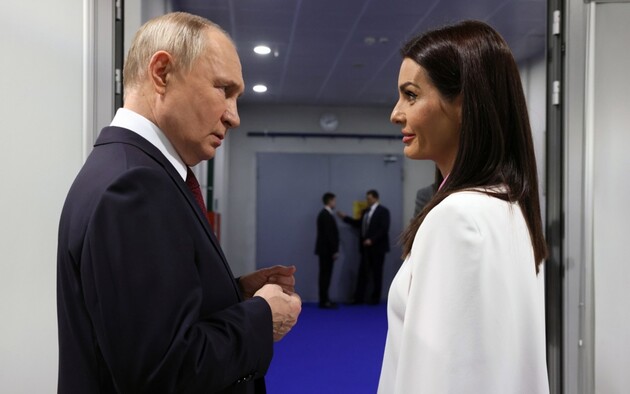How Putin is Destabilizing Moldova and How it Threatens Ukraine

Following Transnistria, Gagauzia also asked Russia for “help” against “oppression” by Chisinau. The head of the autonomy, Eugenia Gutsul, announced this the other day during an unannounced visit to Moscow with the chairwoman of the Federation Council of the Russian Federation, Valentina Matvienko.
Such appeals cause concern not only in Chisinau but also in Kiev, as they show that the Kremlin is upping the ante. Although Putin did not mention Transnistria or Moldova in his annual address to the Federal Assembly, Russian Foreign Minister Sergey Lavrov spoke of “the regime that has settled in Chisinau and which is following in the footsteps of the Kiev regime, sweeping away everything Russian, discriminating against the Russian language in all spheres.”
Seeking to restore the Russian empire, Vladimir Putin looks at Moldova as a territory that belongs to Moscow by right of history. His goal is to sway the situation in this country so that pro-Russian politicians come to power. This will not only prevent Moldova’s movement to the European Union and take control of transport routes, but also create a new hotbed of tension in the region. For Ukraine, such a scenario means an increased threat on its southern borders, which will disperse the forces of both our country and the West in countering Russia’s aggression.
The Kremlin hopes to achieve its goal by hybrid means: given the geographical conditions and the situation on the Russian-Ukrainian front, Moscow has no need to resort to military aggression. There are favorable prerequisites for the Russian security services to work successfully in stirring up the situation in the country: Moldova is experiencing serious economic problems, pro-Russian sentiments are strong in the country, and the rating of pro-European parties is falling.
Moldova will hold presidential elections in autumn. Observers expect the current president, Maia Sandu, to win. Apparently, Moscow is not too concerned about such a prospect, as it has placed its bets on parliamentary elections. After all, Moldova is a parliamentary republic, where the functions of the president are very limited: the head of state represents the country in the international arena, but the government, which is appointed by and responsible to the parliament, is in charge of day-to-day activities.
“As of today, the rating of the pro-presidential party is lower than that of Sandu. And next year Moldova has a chance to get a pro-Russian parliament that will be able to freeze any decision of the head of state,” the deputy executive director of the Foreign Policy Council “Ukrainian Prism,” Serhii Herasymchuk, explained in a commentary to ZN.UA. At the same time, the expert does not rule out that Moscow will work to downgrade Sandu by presenting her as a “president of war.”
The risks of such an outcome of the parliamentary elections in Moldova are obvious to us Ukrainians. After all, in Ukraine in 2006–2007, during the Yushchenko presidency, Viktor Yanukovych was prime minister, relying in parliament on a coalition formed with the participation of the pro-Russian Party of Regions, Socialist and Communist parties.
Working systematically to destabilize the country, the Russians are actively capitalizing on Transnistria and Gagauzia, where pro-Russian sentiments are strong and local authorities have close political and business ties with Russia, as instruments of pressure on Chisinau.
Former Ukrainian Foreign Minister Pavlo Klimkin says that Russia has a plan to destabilize the situation in Moldova and southern Ukraine through Transnistria. However, it seems that the threat emanating from Comrat may be even greater for Chisinau than from Tiraspol: although the Russians control the situation in the two regions, but while Transnistria is formally independent, Gagauzia is part of Moldova and can influence political processes from within, playing the card of center-region confrontation.
Now it is a potential threat, which Chisinau keeps under control, using political, economic, counterintelligence and police methods. Thus, Sandu, under the pretext of an open criminal case against Eugenia Gutsal, did not include her in the government, although according to the Constitution, the bashkan (head) of the autonomy is ex officio a member of it. It should be recalled that Gutsal is supported by Ilan Shor, a Moldovan oligarch and fugitive closely linked to Russia.
Last autumn, the parliament shifted the obligation to refund VAT to economic agents to the budget of the autonomy. Previously, the tax was refunded from the state budget. (A similar measure was taken in relation to Transnistria.) This decision by Chisinau severely narrowed Comrat's financial possibilities. Not surprisingly, the authorities of the autonomy protested. And they succeeded: this week, the Moldovan Constitutional Court declared the amendments to the Tax Code unconstitutional.
But Chisinau, having practically no contacts with Comrat, also does not work with voters in Gagauzia: representatives of the pro-presidential party are poorly represented in the autonomy. It is indicative that the ruling party did not even field candidates in the autonomy in last year's local elections. At the same time, Sandu herself stated that a large-scale propaganda campaign by Moscow is taking place in Gagauzia, directed against the country's leadership and the benefits of EU membership.
And what will happen if Russian agents liven up?
“Although pro-Russian sentiments are strong in Gagauzia, there is no separatism. But the situation in Gagauzia can be sharply rocked by saboteurs and provocateurs, as it happened in 2014 in Donbas. The Russians have enough money and resources to ‘help’ the Gagauzians to take to the streets. And this may frighten Moldovan society, which has been watching Russia's war against Ukraine with horror, and play against the current pro-European government and president,” Serhii Herasymchuk believes.
Scenarios can be different, and they are not limited to the promotion of protest moods through Russian television, the church and social networks — TikTok and VKontakte, large-scale hacker attacks... For example, Transnistria and Gagauzia can be actively pumped with weapons, military specialists and representatives of Russian special services in order to "blow up" the situation in Moldova at the Zero hour and create another source of destabilization on the border of Ukraine and the NATO member country Romania.
Moldovan intelligence intercepted a record level of activity by Russian intelligence services in 2023, and this year has seen new plans of action by Russia, according to the head of Moldova's Information and Security Service (ISS), Alexandru Mustjatse. “We have information that attempts are being made to disrupt the referendum on European integration, to interfere in the presidential election, as well as to discredit government institutions and politicians who support Moldova’s accession to the EU,” Mustjatse said.
As the presidential and parliamentary elections and the referendum on the country's accession to the European Union approach, the situation in Moldova will only become more heated. Russia, acting more and more aggressively, will constantly create new crises, testing the readiness of the Moldovan authorities to respond to them and testing Chisinau's readiness to respond toughly to threats.
Please select it with the mouse and press Ctrl+Enter or Submit a bug











 Login with Google
Login with Google